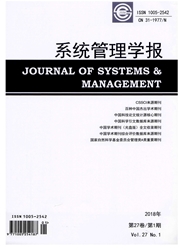

 中文摘要:
中文摘要:
研究了顾客退货信息是非对称情形下的供应链契约设计问题。假定顾客退货信息是零售商的私有信息,零售商作为上市公司不仅关注公司长期的真实收益,同时也会关注公司在资本市场的短期市值。分别研究了对称信息和非对称信息下的最优契约,对不同情形下的契约参数进行了比较分析。最后,通过数值算例对模型结果进行了验证。研究表明:零售商的市值关注会减少订货数量扭曲;制造商的期望利润和供应链的总期望利润随着零售商市值关注程度的增大而增大,而零售商的期望利润在一定条件下首先随着市值关注程度的增大而增大,然后随着市值关注程度的增大而减小。
 英文摘要:
英文摘要:
The contracting problem with asymmetric information of customer returns is considered. Assuming that the information of customer returns is possessed by the retailer alone and cannot be detected by the manufacturer, and the retailer is a listed company who cares about not only the long-term real profit of the firm, but also the short-term market valuation in the capital market, we study the optimal contracts under symmetric and asymmetric information, respectively. Then, we compare the parameters of the contracts under different scenarios. We present numerical examples to illustrate the obtained results. The findings show that the retailer' s interest in market valuation will alleviate the retailer's ordering quantity distortion; the manufacturer's expected profit and the supply chain's total expected profit increase with the degree of the retailer's interest in market valuation. Under some specific conditions, the retailer's expected profit is first increasing with the degree of the retailer's interest in market valuation, and then decreasing with the degree of the retailer's interest in market valuation.
 同期刊论文项目
同期刊论文项目
 同项目期刊论文
同项目期刊论文
 Positive implications of market valuation under asymmetric quality information, DOI:10.1080/00207543
Positive implications of market valuation under asymmetric quality information, DOI:10.1080/00207543 Pricing and production quantity decisions in a supply chain with demand-stimulating service under de
Pricing and production quantity decisions in a supply chain with demand-stimulating service under de Contracting under asymmetric customer returns information and market valuation with advertising-depe
Contracting under asymmetric customer returns information and market valuation with advertising-depe 期刊信息
期刊信息
